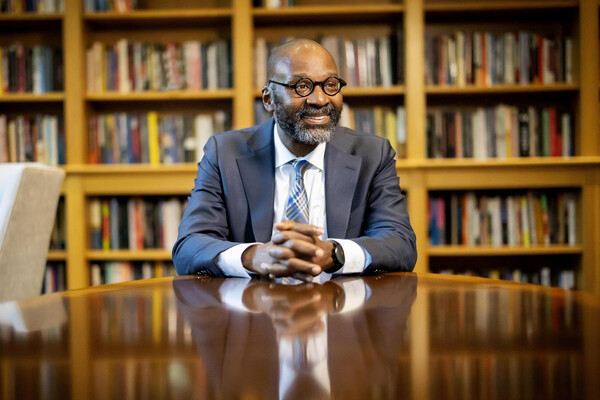
Griffin Pitt, right, works with two other student researchers to test the conductivity, total dissolved solids, salinity, and temperature of water below a sand dam in Kenya.
(Image: Courtesy of Griffin Pitt)
A health scare led Kandi Wiens to her life’s work. Almost a decade ago, while working a high-stress consulting job, earning her doctorate from Penn GSE’s Chief Learning Officer program, and juggling her responsibilities as a mom to three young children, she had a hypertensive emergency during a routine check-up. While she was tapping away at her phone, still conducting work from inside her doctor’s office, a nurse was checking and rechecking her blood pressure, not believing the numbers she was seeing in a seemingly healthy young woman.
Stress was literally killing her, and she needed to find a way to manage it better. In the week that followed, during her doctor-mandated rest, one of the things she pondered was why the stress had impacted her so profoundly. Many of her Penn GSE classmates were also busy working parents with high-stress jobs, but their blood pressure readings hadn’t made medical professionals do a double take. What were they doing differently? She decided to make that question the heart of her doctoral dissertation, exploring stress and burnout.
That research became the basis for her new professional path—one that could not be more timely given the rise of post-pandemic burnout. Wiens is now a senior fellow, director of Penn GSE’s Medical Education master’s program, and academic director of the Penn CLO master’s program. Her new book, “Burnout Immunity: How Emotional Intelligence Can Help You Build Resilience and Heal Your Relationship to Work,” which synthesizes all her research, was released by HarperCollins in April.
“How people experience or feel burnout—and in terms of the consequences for their health, their work, their relationships, and their overall wellbeing—is pretty similar, regardless of their role or industry. I’ve interviewed a lot of law enforcement leaders, educators, bartenders, baristas, lots of leaders in different types of organizations,” says Wiens. “People can, and should, try to work on their individual resilience. But that’s not what’s causing burnout. What’s causing burnout is the work environment—often the high pressure, the culture, and the demands of the job. So, the root cause of the issue needs to be assessed, and there needs to be interventions at the organizational and/or systemic levels.”
Read more at Penn GSE Magazine.

Griffin Pitt, right, works with two other student researchers to test the conductivity, total dissolved solids, salinity, and temperature of water below a sand dam in Kenya.
(Image: Courtesy of Griffin Pitt)

Image: Andriy Onufriyenko via Getty Images

nocred

Provost John L. Jackson Jr.
nocred